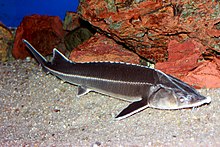چوقه بالغی
Ottoman Turkish
[edit]
Alternative forms
[edit]- چیقه بالغی (çıka balığı) — in Evliya Çelebi
Etymology
[edit]Morphologically from چوقه (çoka, çuka, “baize; broadcloth; drape”) + بالق (balık, “fish”), but in reality the first element is a wanderword of uncertain ultimate origin also reflected in Azerbaijani çökə, Tatar чөгә (çögä), Tarsk Siberian Tatar чүкә (çükä), Chuvash ҫӗкӗ (śĕk̬ĕ), Eastern Mari сӱгӧ (sügö), Udmurt чуке (ćuke), Armenian չուքա (čʻukʻa), Bulgarian чи́га (číga), Serbo-Croatian čȉga / чи̏га, Romanian cegă, and with an unexplained additional first syllable in Hungarian kecsege, Serbo-Croatian kèčiga / кѐчига, Slovene kečíga, Polish czeczuga, Ukrainian чечу́га (čečúha), кече́га (kečéha), Russian чечу́га (čečúga), Romanian căciugă, Greek κέτσιγα (kétsiga), all referring to the sterlet.
It has been suggested that the Ottoman Turkish term is borrowed from a Slavic language, from Proto-Slavic *ščùka (“pike (fish)”), whence Hungarian csuka.[1][2] In this respect note that Armenian չուքա (čʻukʻa, “sterlet”) has also been identified with the pike.
Noun
[edit]چوقه بالغی • (çoka balığı, çuka balığı)
- sterlet, any smaller, common Eurasian sturgeon, of the species Acipenser ruthenus
Descendants
[edit]- Turkish: çuka balığı, çuka, çiga, çığa
References
[edit]- ^ Miklosich, Franz (1889) Die slavischen, magyarischen und rumunischen Elemente im türkischen Sprachschatze (Denkschriften der Kaiserlichen Akademie der Wissenschaften. Philosophisch-Historische Classe; 118) (in German), Vienna, page 6
- ^ Tietze, Andreas (2002) “çuka I”, in Tarihi ve Etimolojik Türkiye Türkçesi Lügati [Historical and Etymological Dictionary of Turkish] (in Turkish), volume I, Istanbul, Vienna: Simurg Kitapçılık, Österreichische Akademie der Wissenschaften, page 538a
Further reading
[edit]- Barbier de Meynard, Charles (1881) “چوقه”, in Dictionnaire turc-français, volume I, Paris: E. Leroux, page 611
- Beke, Ödön (1938) “Skr. kečiga”, in Zeitschrift für Slavische Philologie[1] (in German), volume 15, number 1/2, pages 118–119
- Çağbayır, Yaşar (2007) “çuka2”, in Ötüken Türkçe Sözlük (in Turkish), volume 1, Istanbul: Ötüken Neşriyat, page 1056
- Kélékian, Diran (1911) “چوقه بالغی”, in Dictionnaire turc-français[2], Constantinople: Mihran, page 480
- Pallas, Peter Simon (1811) “Acipenser pygmaeus”, in Zoographia Rosso-Asiatica (in Latin), volume III, St. Petersburg: Academy Press, § 85, pages 102–103
